Contributors
On Cooking Southern: Make A Date With These Holiday Goodies
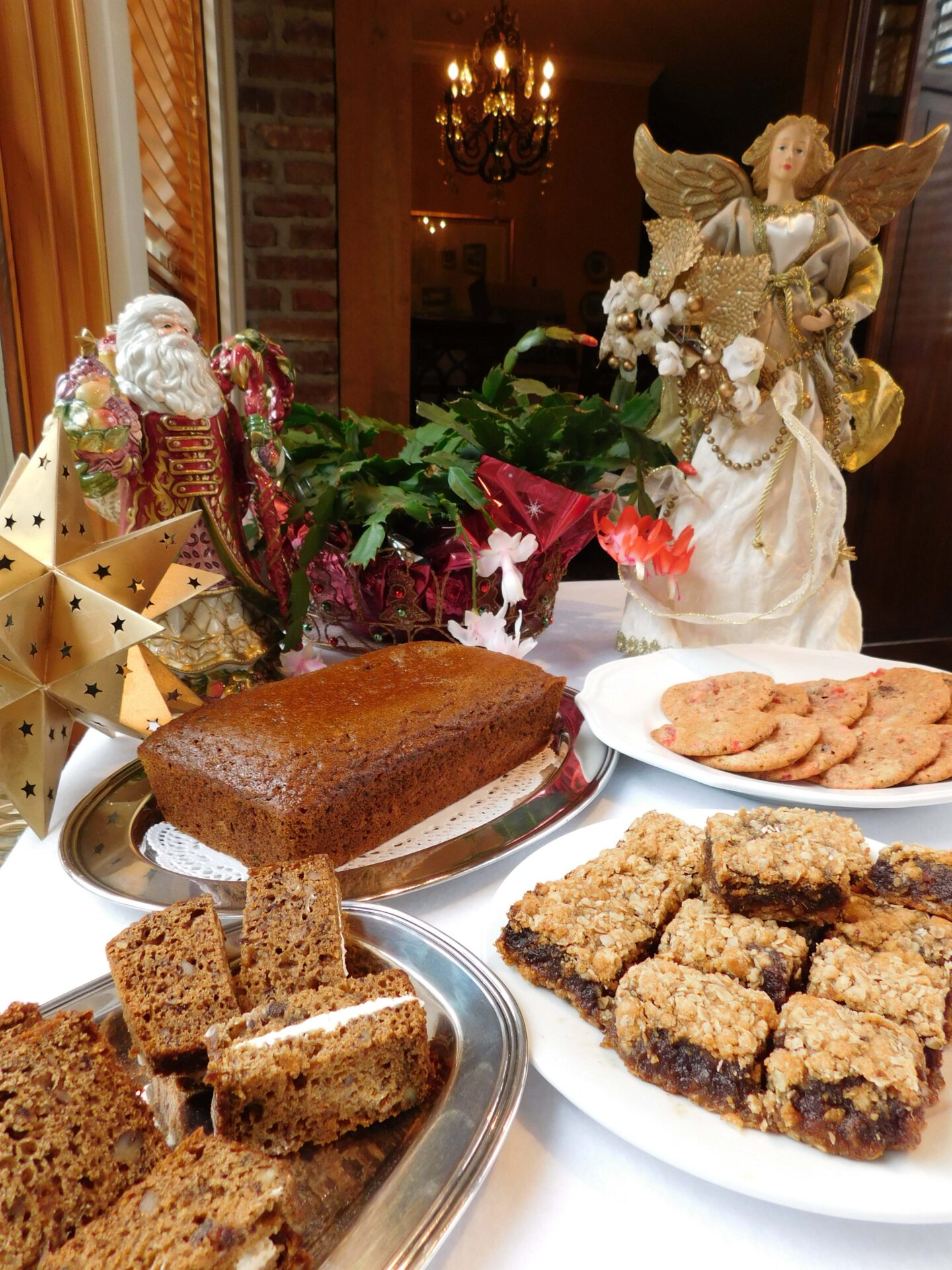 SOUTHERNISM OF THE WEEK
SOUTHERNISM OF THE WEEK
One jingle bell short of a full ride: That sleigh is full but someone is not pulling their full load. Related to “that dog won’t hunt” and “the light’s on but nobody’s home.”
It’s that time of year again. Hubby tiptoes through the kitchen, alternately muttering “You just LUUUUV Christmas,” and “You’ve turned into my mother,” wincing as he glimpses the cluttered kitchen countertops.
After 43 years, he’s given up nagging me to clean up. He knows that eventually the Christmas elves will transform the mess into carefully measured stacks of festively wrapped goodies destined for distribution among friends and neighbors. He’ll even be given the broken pieces as consolation.
Yes, I confess that not all my holiday baking efforts are successful. Some goodies break or crumble. Some scorch. And some fail to rise to their full potential for perfection. Such occurrences always provide opportunities for personal culinary growth. Whenever I revisit the steps that led to the downfall of the moment, a basic axiom for baking inevitably reminds me: Dump cooking doesn’t work. My usual laissez faire approach to cooking invites problems that would easily be avoided if I followed the down-to-the-micro-smidge chemistry-based school of baking.
For instance, when making Mom’s Billy Goat Cookies last week, I failed to factor in the extreme damp and barometric pressure fluctuations accompanying the downright lousy weather. The result? All my cookies fell flat instead of puffing up.
I have been making those cookies for 40 years, and this was my first flop. The expensive ingredients guarantee that next time I will be more cautious when measuring, beating, heating and cooling those babies. Billy Goats also have been added to my cookie-and-candy pantheon of what not to make when it’s raining (think pralines and divinity).
I also strongly suspect my new KitchenAid stand mixer contributed to the downfall. Over mixing is never a good thing when balancing gluten and “rise” in baked goods.
Speaking of Billy Goat cookies, I searched and searched for the origin of this crazy-named cookie containing dates and nuts. Others have researched before me, but also to no avail. What we all confirmed is that some cookie iteration or another called Billy Goats has been around since at least the 1930s.
I suspect that these date-based cookies are connected to the spread of date farming in California during that period. Although dates have been cultivated in California since the 18th century when Spanish missionaries planted date palms around their settlements, the region’s commercial date production stemmed from the 1927 importation of 11 Medjool date palm offshoots during a catastrophic Moroccan “bayoud disease” killoff of that nation’s prized date palms.
All Medjool date palms in the United States today are descended from those 11 disease-free offshoots. The modern American date-production industry is one of the largest in the world, still centered in the Southern California’s Coachella Valley and in Southwestern Arizona. Date farming also flourishes in Texas, outside Las Vegas, Nevada, and in parts of Louisiana and Florida. Medjool palms also are popular in American landscaping wherever desert conditions coincide with good groundwater resources.
Medjools are known as the “king of dates” for their extraordinary size and sweetness. Yet Medjools are merely one of hundreds of varieties that grow worldwide. Date palm cultivation dates back more than 7,000 years, rooted in the Middle East and North Africa. In fact, dates and the date palm play an important role in all three religions of “The Written Book.”
Some scholars suggest that the date palm was the tree of knowledge in the Garden of Eden. All parts of the plant (which, like bamboo, is not technically a “tree”) are usable, dates can be stored indefinitely, and a person can survive on 15 dates a day. A date palm offshoot can produce fruit within five years of planting.
Considered out of fashion for a generation of Americans, the lowly date is coming back into favor as globalization of cuisines influences our culinary tastes. It is one food that deserves to become popular – dates, with their natural sugar content, guarantee any dish containing them to be delicious.
Try this week’s date-laden recipes and I’ll bet you become a fan like me.
MOM’S BILLY GOAT COOKIES
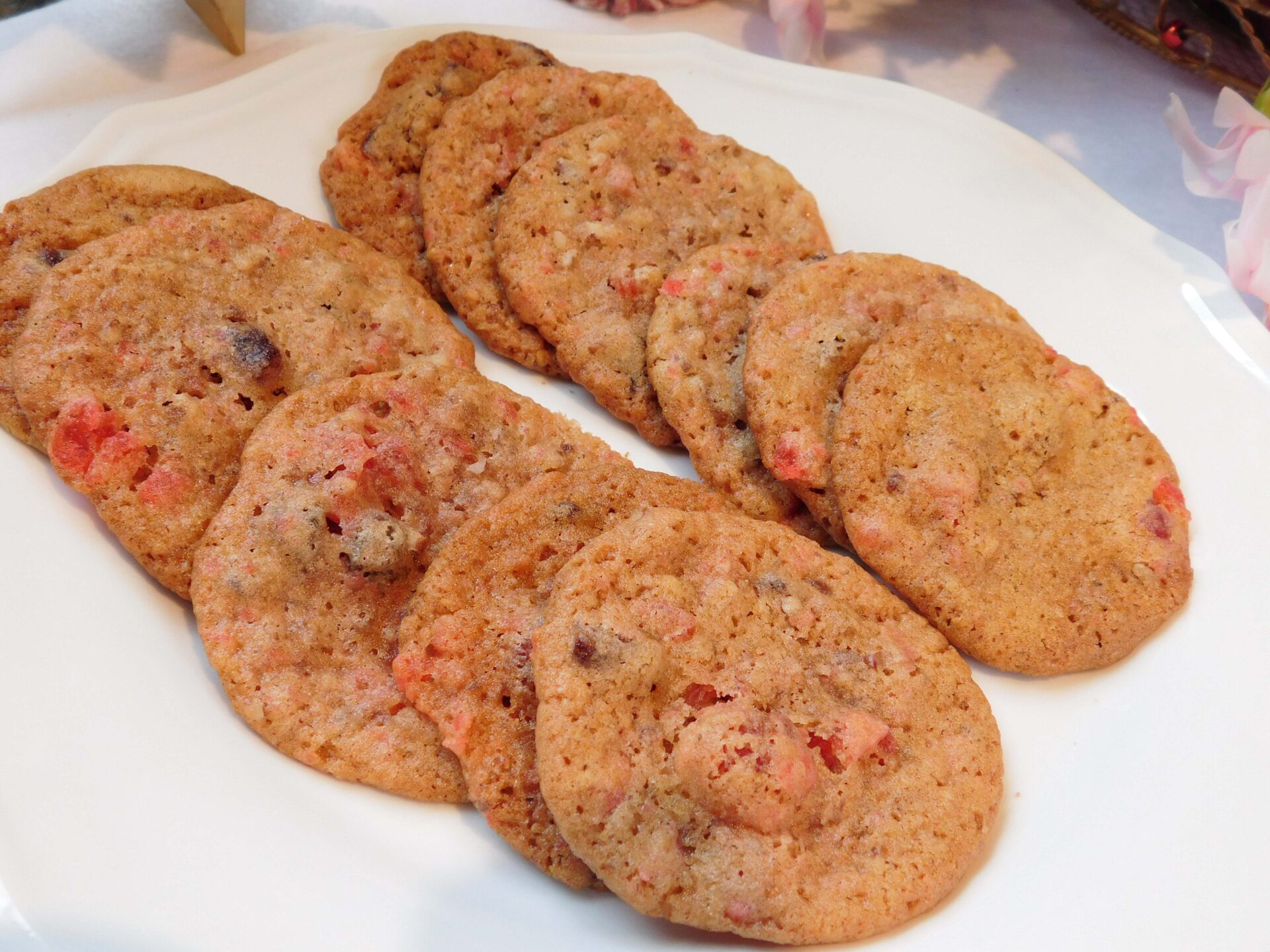 For puffier cookies, substitute vegetable shortening for half the butter (1/2 cup of each), do not overbeat after adding the flour; fold in the cherries at the end.
For puffier cookies, substitute vegetable shortening for half the butter (1/2 cup of each), do not overbeat after adding the flour; fold in the cherries at the end.
1 c cold unsalted butter
1-1/2 c sugar
3 egg yolks
1 tsp vanilla extract
2-1/2 c pre-sifted plain flour
1 tsp baking soda
1/8 tsp salt
1 tsp cinnamon
1/4 tsp cloves
2 T buttermilk
1 c chopped nuts (I use roasted, salted pecans)
1 c chopped dates
1/2 to 1 c halved, red candied cherries
Blend butter, sugar, egg yolks, and vanilla on medium speed 2-3 minutes. Sift dry ingredients together three times. Add to wet batter. Do NOT over beat. Blend in the milk, fold in the nuts, dates and cherries. Drop on cookie sheet lined with parchment paper by the teaspoon. Bake at 325ºF in preheated oven about 12-15 minutes. Cool on rack. Store in sealed metal container.
CLASSIC DATE BARS
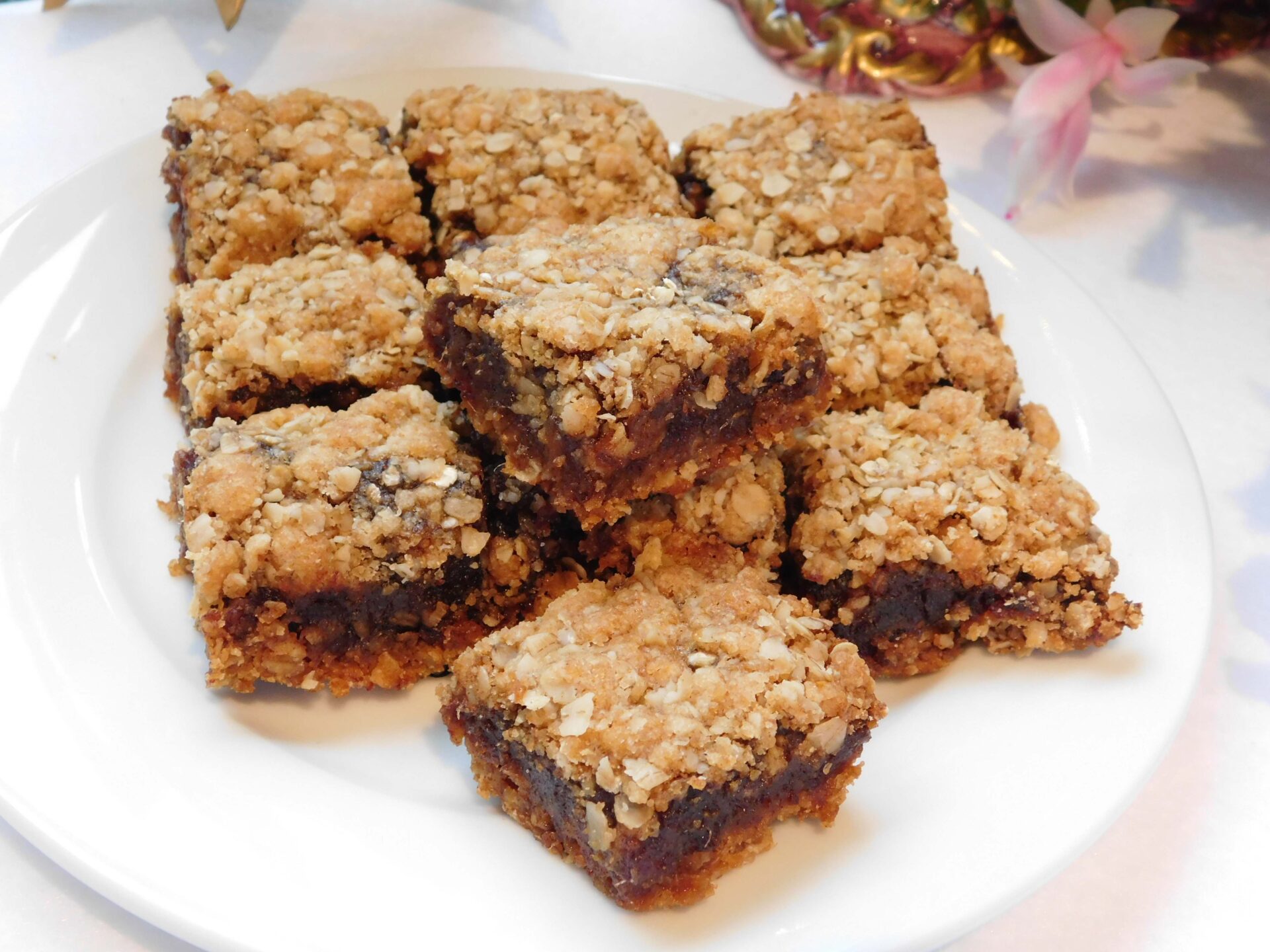 I believe this recipe originally was developed by Betty Crocker in the 1950s. It is the recipe I made when sending boxes of goodies to Hubby and his battalion in Kuwait and Iraq during Operation Desert Storm. These bars remain intact and safe to eat during temperature extremes!
I believe this recipe originally was developed by Betty Crocker in the 1950s. It is the recipe I made when sending boxes of goodies to Hubby and his battalion in Kuwait and Iraq during Operation Desert Storm. These bars remain intact and safe to eat during temperature extremes!
3 c chopped pitted dates
1/4 c white granulated sugar
1-1/2 c water or orange juice
1/3 c coarse-chopped walnuts, optional
1-1/4 c all purpose flour
1 tsp table salt
1/2 tsp baking soda
1-1/2 c quick cook (not instant) oats
1 c packed light brown sugar
1/2 c salted butter, softened
1 T water
Combine dates, sugar and water or orange juice in medium saucepan. Cook on medium heat, stirring frequently with a wooden spoon, until mixture thickens – about 5 minutes. Stir in optional walnuts once thickened. Cool.
Sift flour, salt and baking soda in a large bowl. Whisk in the oats and brown sugar until blended. Cut in the butter until mixture is crumbly. Sprinkle tablespoon of water over mixture and stir gently to moisten evenly. Mixture measures out to about 4-3/4 cups; divide in half. Spread half of mixture into a greased 9-by-13-inch baking pan; pat lightly.
Spread the date mixture evenly over the oats layer. Cover with remaining oat mixture. Pat lightly. Bake 35-40 minutes, until topping is lightly browned, 30-35 minutes, turning pans after 20 minutes. Cool on a wire rack. Cut into bars when completely cooled. Yield: Up to 40 rectangular bars.
DATE NUT BREAD
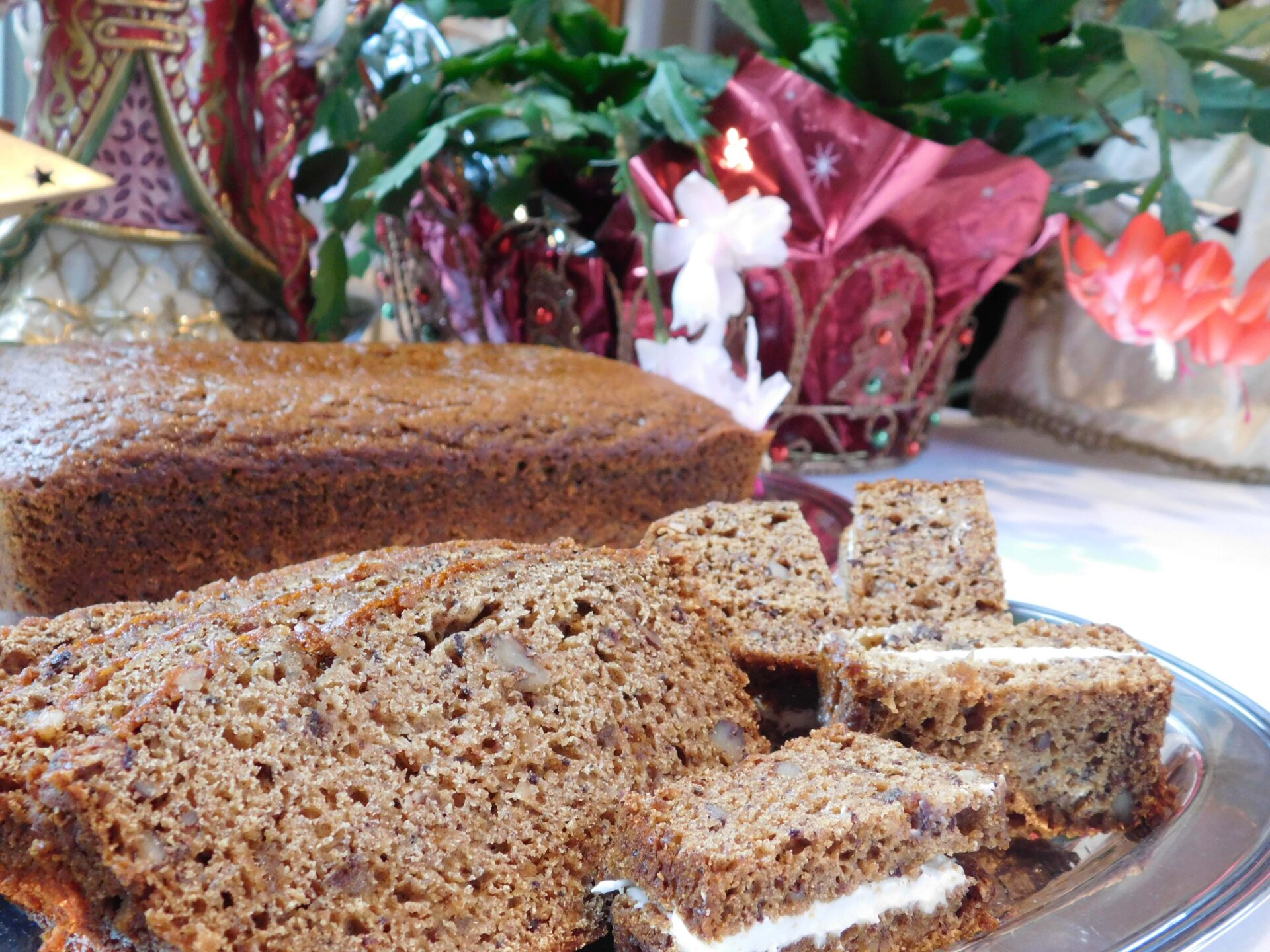 When preparing this column, I had attempted a newer version of date bread, but the results came out as a sticky dense dark mess that bubbled and failed to rise properly. Upon review, I realized I’d used salted butter instead of unsalted, had measured the dates improperly, and the recipe I was following had inadvertently omitted baking powder. The experience made me realize that one shouldn’t mess with perfection. This classic date bread never fails if the directions are followed.
When preparing this column, I had attempted a newer version of date bread, but the results came out as a sticky dense dark mess that bubbled and failed to rise properly. Upon review, I realized I’d used salted butter instead of unsalted, had measured the dates improperly, and the recipe I was following had inadvertently omitted baking powder. The experience made me realize that one shouldn’t mess with perfection. This classic date bread never fails if the directions are followed.
1 c (a package) chopped, pitted dates
1/2 c boiling water
1-1/2 c all purpose flour
1 tsp baking soda
1 tsp salt
1 tsp baking powder
1 egg, lightly beaten
1/2 c light brown sugar, packed
1/2 c chopped walnuts
Place dates in large nonreactive bowl. Pour boiling water over the dates and soak until it cools to room temperature
Preheat oven to 350˚F. Grease loaf pan and line with parchment. Grease parchment with shortening. Sift dry ingredients together and set aside.
Beat egg in large bowl and mix in sugar. Add Dates. Fold in flour to mixture in three parts until blended. Fold in walnuts.
Pour into the loaf pan and bake about 60 minutes in preheated oven until toothpick inserted in center comes out clean. Loosely tent buttered foil over top of pan during last 10-15 minutes if needed, to prevent top from becoming too brown.
Remove to wire rack to cool. Slice and serve with cream cheese, toasted or fresh.
DATE FACTS FOR HOME COOKS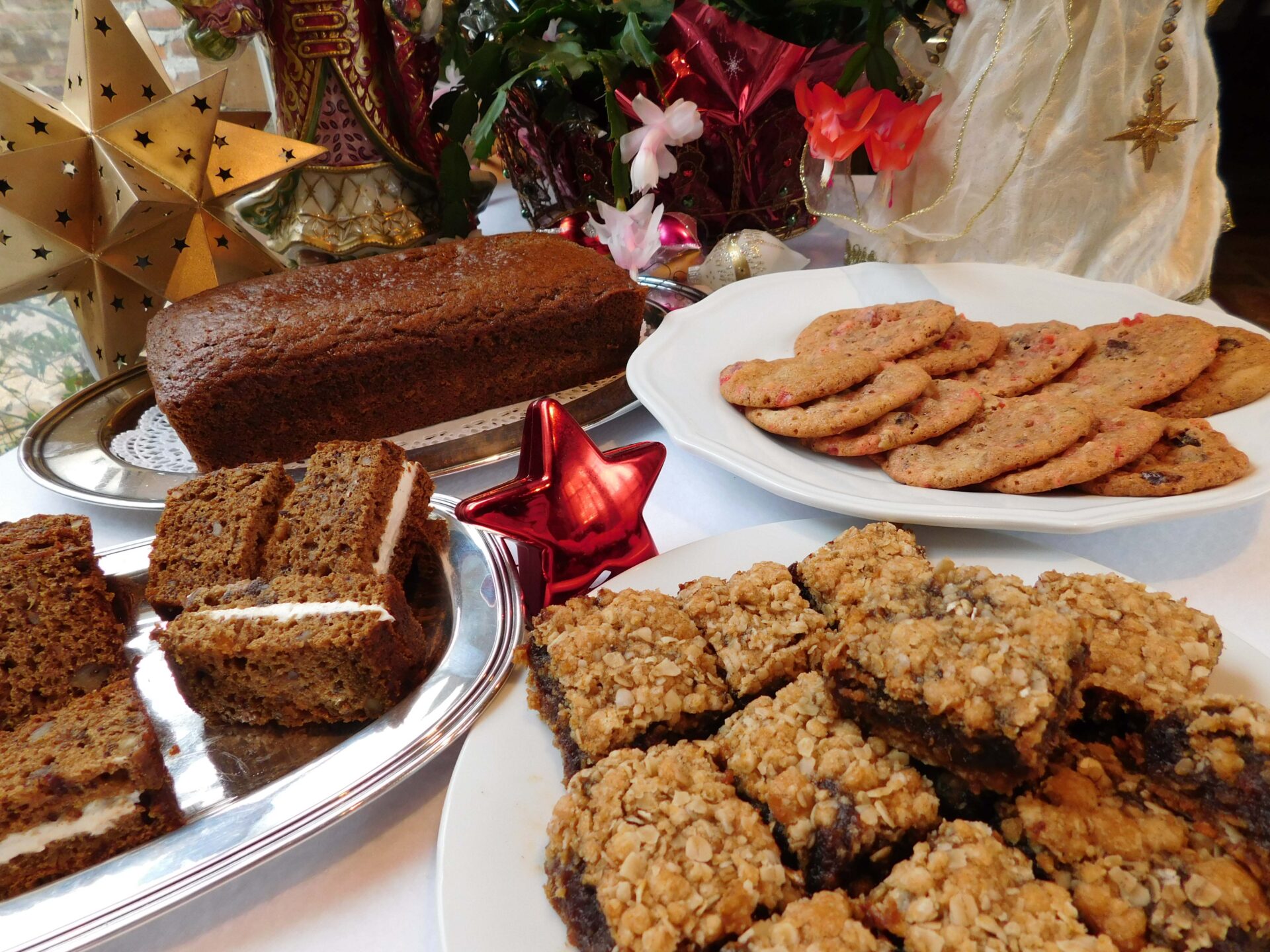
• One cup of dates has 400 calories, 27 percent of recommended daily potassium and 48 percent of daily fiber needs.
• Dates provide zinc, iron, copper, magnesium, calcium and other minerals; they also contain antioxidants called polyphenols – all disease-fighting components.
• Very few people are allergic to dates, which, while high in natural sugars, have a low glycemic index.
• Fresh dates usually have been left on the palm long enough to fully ripen and begin to dry. They may be stored at room temperature or tightly covered in the fridge.
• The longer a date is dried, the more intense the sugar; the white spots or white film on dried dates are sugars that have leached to the surface. These dates are okay to eat.
Laurie Triplette is a writer, historian and accredited appraiser of fine arts, dedicated to preserving Southern culture and foodways. Author of the award-winning community family cookbook GIMME SOME SUGAR, DARLIN’, and editor of ZEBRA TALES (Tailgating Recipes from the Ladies of the NFLRA), Triplette is a member of the Association of Food Journalists, Southern Foodways Alliance and the Southern Food and Beverage Museum. Check out the GIMME SOME SUGAR, DARLIN’ website and follow Laurie’s food adventures on Facebook and Twitter.
Follow HottyToddy.com on Instagram, Twitter and Snapchat @hottytoddynews. Like its Facebook page: If You Love Oxford and Ole Miss…





























